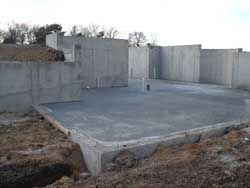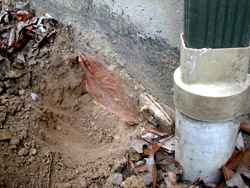DEAR TIM: Are there time limits for pursuing a lawsuit against a home inspector? Here's the skinny of our situation. I bought my current house at the end of October in 2002, so we have been living in it just over 3 years. The problem we are having is that at one corner of the house, the foundation is cracked. Along with that, the walls in the dinning room above the crack are starting to crack as well, as the house is settling with the crack in the foundation
On my home inspection at the time, there was no indication of the crack or any faults in the foundation. Others are telling me differently, as well as some other items that should have been marked as well. Can we go back now and do anything about it? This was three years ago, but we are now starting to see the damage that the crack is causing. Mike Trotter, Tyler, TX
DEAR MIKE: For starters I am not a lawyer and can't give you any legal advice. What's more I have no clue as to the statute of limitations in your state with respect to the amount of time you have to file a claim. You need to consult with a lawyer that specializes in residential litigation and consumer rights law. But you should know that among other things, I am a licensed real estate broker in the state of Ohio and many years ago I performed some of the first home inspections in my city long before it was an accepted practice or the large industry it is today.
But your comments above lead me to suspect that you have very little solid legal ground upon which to stake a claim. If I understand your situation as described, you said that the original report indicated no problems with the foundation. To make matters worse, I suspect you might have signed the inspection report stating that you agree with the inspector's findings to the degree defects are visible. If you did this, it is my common-sense opinion that you took the responsibility for looking around to see if you could see cracks or other defects.
Even if you did not sign the inspection report, the report might have contained language that stated the findings of the inspector are valid if you do not dispute them within a given time period after the inspection is complete.
The reasons for this are many. For starters, imagine if the house was indeed crack-free at the time of the inspection. But within a week of the inspection imagine if some of these things happened:
- a landslide happens below the house and causes your lot to become unstable
- an earthquake shakes the region
- some blasting occurs nearby for a road construction project
- a drought causes the soil below the house to shrink and contract
- etc.
The cracks would not be the fault of the inspector at all. They happened after the inspection. It would be completely unreasonable for you to expect any relief from the inspector in this situation. This is why you pay house insurance premiums. If you have a great policy and you have added certain available insurance riders, there is a strong possibility the damage may be covered by your insurance company. I would always call my insurance agent first before I would call a lawyer.
You might also speak with your neighbors. Often a neighbor is aware of problems and just stays out of the way. But if you ask, the neighbor may remember the previous owner doing work to try to correct or mask a problem. The neighbor may have a recollection of professionals who came to the house to do certain things like pier or re-support the foundation. Your job is to uncover evidence, if it exists, that the condition may have existed at the time the inspector was there.
The lesson you should learn from this experience is simple. If you ever purchase another home, take a high-quality digital camera with you the day the inspector is scheduled to look at the home. Follow the inspector around the house and shoot hundreds of photos of every visible surface in the home. Take close-up shots of things that concern you or look suspect. You may not see any defects, but there could be strong clues that would be immediately recognizable to an expert who looked at the photos years later.
Be sure to date the photos and immediately copy them to a CD-ROM. Make a copy of the CD-ROM and send it to a trusted friend who will safeguard it and who can later vouch that the photos were taken in the past and not faked a few days ago for the benefit of a convenient lawsuit.
Column EM0010







